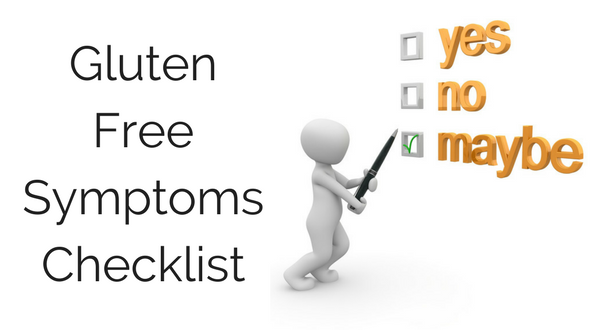What are the signs of gluten intolerance? There are a wide range of them, ranging from minor inconveniences to potentially life-threatening conditions. Spotting gluten intolerance symptoms can help you avoid further damage to your system. If you have children who exhibit wheat intolerance, you’ll be able to get them on the right diet in order to promote healthy growth.
The thing about gluten intolerance is that it isn’t something with just one symptom. Wheat intolerance can have many different effects on your body. Many of the most common are digestive issues, which can be caused by a number of different medical conditions. Other gluten intolerance symptoms can also be caused by other issues, ranging from diet to congenital issues.
Here is a gluten intolerance checklist to help you identify signs of what sensitivity. If you are what sensitive, you will notice these symptoms most often after or even as you consume gluten.
Bloating. Bloating is the feeling of your stomach being swollen or full of gas after you’ve eaten. It’s one of the most common symptoms of gluten intolerance.
Nausea, indigestion, diarrhea, gas, and or smelly feces. While it’s quite normal to get these symptoms on occasion, they are also very common among people with wheat sensitivity or wheat intolerance. If you have celiac disease, exposure to gluten will cause inflammation in your gut, resulting in damage to the lining of your gut and poor nutrient absorption. This causes these symptoms. Frequent diarrhea can be quite dangerous, especially for children, since it dehydrates the body at an accelerated rate.
- Stomach cramps. Abdominal pain is not in itself a gluten intolerance symptom, but it is another major and frequent sign of celiac disease.
- There are many possible causes of headaches, including dehydration, eye strain, and stress, but if you can’t figure out why your head hurts, it could possibly be a symptom of gluten intolerance.
- Like headaches, frequent fatigue can have many causes. For those who suffer from celiac disease, it is a very common gluten intolerance symptom.
- Skin conditions. There are several of these that are linked to gluten intolerance.
- Keratosis Pilaris. Also called “chicken skin”, it appears on the back of the arms.
- This is an inflammatory skin condition that causes reddening and scaling of the skin.
- Alopecia areata. This skin condition causes non-scarring hair loss.
- Chronic urticaria. This shows up as recurring and itchy pink or red lesions with pale centers.
- The raised itchy bumps we all know and hate.
- Patches of red, irritated skin, which can be itchy and/or painful.
- Depression and anxiety. These are more common among people with gluten intolerance.
- Iron-deficiency anemia. This is a major condition that can be caused by a lack of iron due to gluten sensitivity interfering with your body’s ability to absorb nutrients. This possible slum intolerance symptom includes a list of symptoms of its own, including fatigue, shortness of breath, low blood volume, headaches, weakness, and pale skin. This can be among the most important gluten intolerance symptoms in children because adequate iron intake is so important to healthy growth.
- Inexplicable weight loss. While you may be happy that you’re suddenly losing weight, it’s never good when your weight suddenly begins changing for no apparent reason. Weight can only be changed by a cause and not knowing that cause is a reason for concern. Celiac-related weight loss is often caused by poor nutrient absorption as well as the digestive issues mentioned above.
- Autoimmune disorders. This is what celiac disease is, as well. If you are gluten intolerant, your immune system attacks your digestive tract after you ingest gluten. Having this autoimmune condition will make you more prone to others, including Hashimoto’s thyroiditis, rheumatoid arthritis, ulcerative colitis, lupus, psoriasis (mentioned above), scleroderma, or multiple sclerosis.
- Joint and/or muscle pain. This is another possible gluten intolerance symptom that is often linked to many other causes. For those with gluten allergies, it is caused by inflammation after ingesting gluten.
- This is a fancy way of saying numbness or tingling in the legs or arms. It is more common among people who are gluten intolerant.
- Hormone imbalances. Because gluten intolerance wreaks havoc on your system, it can mess up the way your hormones work, too. It can even be one of the possible causes of unexplained infertility.
- This is a life-threatening condition and fortunately is a very uncommon reaction to gluten. It’s the same thing that happens to people who are allergic to bee stings if they have been stung. The body’s reaction to the allergen is so severe it puts the person into shock, causing very rapid heartbeat, nausea, fainting, and many other symptoms. The most immediately dangerous effect is the swelling of the airways, which can cause someone to be unable to breathe.
If you or your child have several of these symptoms on a regular basis (or even a single instance of anaphylaxis), talk to your doctor. There are several different tests they may do. The most common and probably the most helpful to see if you have a wheat sensitivity is a genetic test that should come back pretty quickly.
Gluten sensitivity tends run in families, so it’s
Knowing what could possibly be gluten intolerance symptoms can help improve both health and happiness. If you take a look at this gluten intolerance symptoms checklist and see a number of issues that are all too familiar for you or a loved one, go get a wheat intolerance test done by your doctor. That way you can find the right diet and lifestyle to get back to better health.

